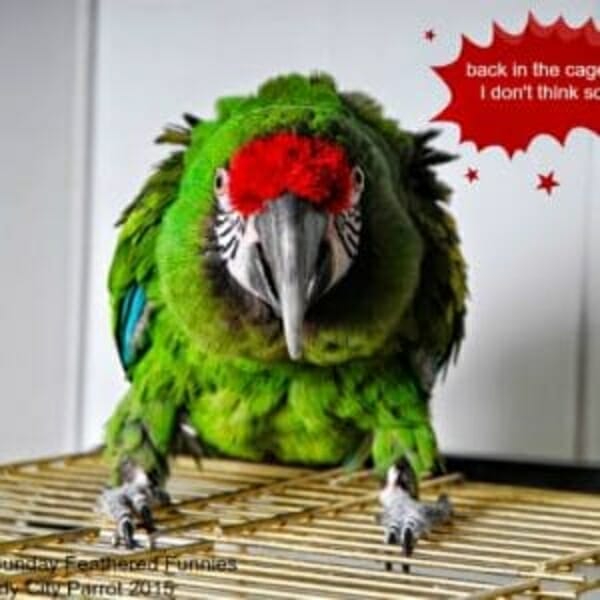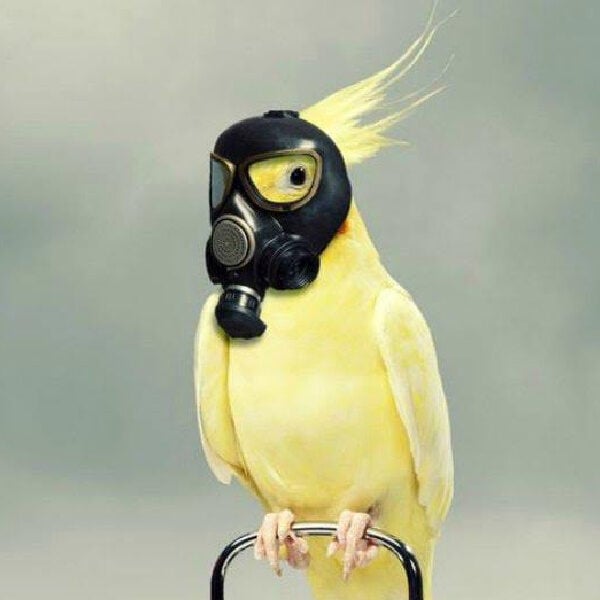
R-E-S-P-E-C-T the Beak!
Last Updated on by Mitch Rezman
R-E-S-P-E-C-T that is what your parrot needs
Aretha Franklin famously sang the song Respect where that word was spelled out as above. The song was about demanding that a man respect her if he wanted her love. But the same word applies to our parrots just as much if we want to develop good, healthy, loving relationships with them.
These magnificent animals are not like domesticated dogs and, in some cases even cats, whereupon first meeting, positive interaction is likely.
Many companion dogs love everyone and pretty much never met a stranger. This is also true of some hand-reared well-socialized parrots, but when dealing with a semi-tamed or untamed parrot or a recently rehomed or rescued parrot, respect must be at the forefront of the relationship-building process.
My Space – Your Space
We as humans become quite uncomfortable if a stranger gets too close, into our personal space. Even a friend can cause us to feel uncomfortable if they press into our personal space too often.
For a rehomed or unsocialized parrot, its personal space can be quite large, demanding that you give it plenty of room until it becomes used to your presence.
Of course, you have to approach the cage to provide food and water, but that can be done from outside the cage using feeder doors with well-designed cages.
Avoid passing your hands right in front of the parrot’s face or beak at first. Let it become used to your presence for a few days or even a few weeks, depending on the bird’s history.
If it has a serious mistrust of humans, this process will take longer, but move slowly and calmly as you go about feeding, watering, and cage cleaning at first.
Expect Nothing From An Abused Parrot
Too often we humans expect too much too fast from a parrot we are training or building a relationship with. It is far better to keep expectations low or even nonexistent and be happily surprised rather than expecting rapid progress and being disappointed.
Disappointment can lead to frustration on the human’s part and result in thoughtless actions that can revoke any progress that has been made. If you don’t respect the bird’s feelings, how can you expect it to want to please you?
Move-in Tiny Steps
As you begin to build a relationship with a parrot, break things down into tiny baby steps with each step positively reinforced.
Once you convince the bird to accept a morsel of a high-value treat like a sunflower tidbit or a bit of a nut from your fingers, you can begin to ask it to move closer to your hand, one step at a time, to earn the treat.
During the early sessions, even putting on foot closer to you or making eye contact if it has been shy about that behavior should earn a treat.
Once the bird begins to feel comfortable as evidenced in body language and readiness to get the treat, you can ask for another baby step to be added, perhaps taking two steps toward your hand, until eventually, the bird will walk readily over to earn a treat.
From there, you can begin to ask it to place a foot on your finger, eventually working toward having it step onto your hand for the reward and love.
Respect every tiny bit of progress made and let the bird know how happy you are with it for making an effort to get to know you and trust you.
Never Lose Your Temper
If we let our frustrations during training get the best of us, we may lose our temper and shout at the bird. This is sure to make the bird take two steps back as far as progress goes, just the reaction we don’t want.
If you feel yourself becoming stressed because of lack of progress at the rate you desire, step away and come back when you feel calmer and more relaxed and the bird is also more relaxed. Respect your shortcomings just as you do the birds.
Never Force A Behavior
A big mistake some trainers make is forcing a bird to accept an action or behavior without allowing it the respect of being able to say no.
This results in what is known as Learned Helplessness, a subject of a post in the very near future.
Basically, it means the bird has no choice or control over a situation and “gives up” because it feels helpless. This can have big impacts on future training, and overall relationship and removes any feeling the bird had of being respected by humans. It can even impact the bird’s immune system and will to live.
Find a Way to Say Yes a Lot
As you train your parrot, if it indicates it wants something it can’t have or can’t have right now, avoid using that big two-letter NO word.
Instead, focus on some way to tell it yes, for example, yes, you can play with this toy for now or yes, I will talk to you while I clean house.
Don’t tell it NO all the time because that is a blocking word and doesn’t sound very nice and pleasant. Speak happily and seek out ways to say yes to something the bird will focus on instead of the thing or action that can’t be done right now.
Patience, Patience, Patience
Consider your childhood for a moment. When you were first born, someone in your life had to give you care 24/7, change smelly diapers and perform other frustrating and arduous tasks, often in the middle of the night without complaint.
As you grew, you learned new things and new behaviors but still were quite a demand on your parent or caregiver for years to come.
Then the teen years hit and it often becomes even more stressful for your guardian. This process of rearing you to be a productive, caring grownup required tons of patience on the part of your parents or guardians.
Give a bird the same patience and respect by caring for its needs calming, without resentment, and with love. The bird won’t always do what you want when you want, but you can build a loving relationship by continuing to respect the bird as a magnificent intelligent creature that is both alike and different from you.
A little patience can go a lot way in building a lifelong relationship with a parrot. Keep this in mind when those little things like cleaning up poop and changing cage papers may seem trying at best. Remember, just as with a child, the parrot did not ask you to place it in your home.
Above All, Keep Trying and Respecting
Sometimes progress may be painfully slow, especially with abused birds. Some birds may never progress as far as you’d like.
But the key is to continue to try to consistently teach the parrot with loving respect the behaviors you desire through rewards, love, praise, and attention, and suddenly, one day, out of the blue, just as you feel like giving up, the bird may well perform what you have been working on and so much more. Don’t give up and never lose respect for the parrot.
Written by the Windy City Parrot Content Team
Author Profile
Latest entries
 Feeding Exotic BirdsDecember 29, 2025How to Switch or Convert Your Bird From Seeds to Pellets: Real-Life Case Studies and Practical Guidance
Feeding Exotic BirdsDecember 29, 2025How to Switch or Convert Your Bird From Seeds to Pellets: Real-Life Case Studies and Practical Guidance Feeding Exotic BirdsDecember 16, 2025A Practical, Budget-Smart Guide to Feeding Birds Well
Feeding Exotic BirdsDecember 16, 2025A Practical, Budget-Smart Guide to Feeding Birds Well Bird EnviornmentsDecember 7, 2025Understanding Budgie Cage Bar Orientation: Myths, Realities & Practical Solutions for Vertical-Bar Bird Cages
Bird EnviornmentsDecember 7, 2025Understanding Budgie Cage Bar Orientation: Myths, Realities & Practical Solutions for Vertical-Bar Bird Cages Feeding Exotic BirdsDecember 5, 2025How Dr. T.J. Lafeber Rewrote the Future of Pet Bird Nutrition
Feeding Exotic BirdsDecember 5, 2025How Dr. T.J. Lafeber Rewrote the Future of Pet Bird Nutrition
This Post Has One Comment
Leave a Reply
You must be logged in to post a comment.



RJAvery
30 May 2021Six years as the home of a 45+ year old, male yellow-naped Amazon, with arthritis in his shoulders so he’s a “Walking boss” https://uploads.disquscdn.com/images/f7af9977c74f10e29894a26971326394c4eafba42e6f9f154720983f7aa6162b.jpg . We still argue during hormone-season, but the rest of the year things are smooth sailing. Scars fade and its worth it to know that he’s got a safe home for the rest of his life (Yeah, I’ve already got his next two keepers lined up and in training)